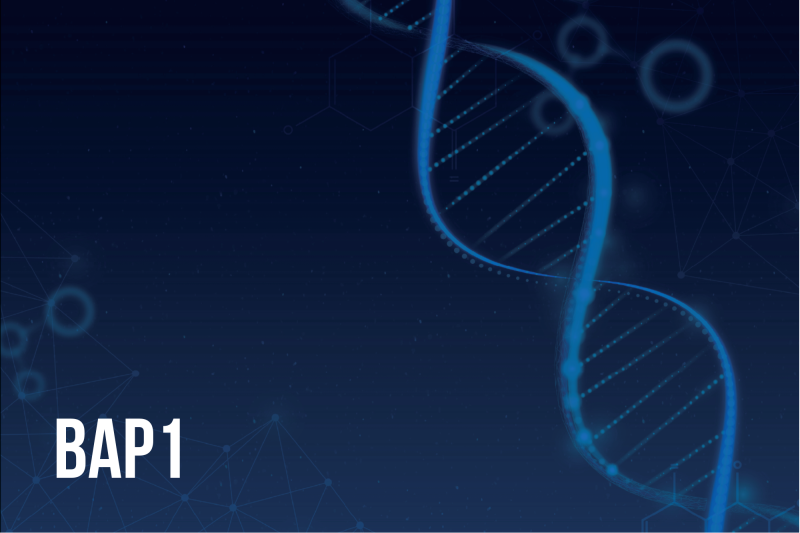PUBLISHED: 30th July 2025

The BAP1 or BRCA1-associated protein 1 gene is a tumor suppressor. It keeps cells from growing and dividing too fast or in an uncontrolled way.
What is a BAP1 mutation?
People with a mutation in the BAP1 gene may develop BAP1 tumor predisposition syndrome. This syndrome is associated with an increased risk of several cancers, including uveal melanoma, a cancer that develops in the middle layer of the eye; cutaneous melanoma, a type of skin cancer that develops in the lining of the lungs; mesothelioma, cancer in the lining of the stomach and other internal organs; and renal cell carcinoma, a type of kidney cancer. People with a mutation in BAP1 may also develop growths on the skin that are not cancerous.
What are the risks of cancer for people with a BAP1 mutation?
For people with a BAP1 mutation, the overall lifetime risk of developing at least one BAP1-associated cancer is up to 85%. However, because so few people have a BAP1 mutation, this lifetime risk is likely overestimated.
| Cancer type | Lifetime risk with a BAP1 mutation | Lifetime risk for the general population |
| Uveal (eye) melanoma | 20-25% | Up to 3% |
| Cutaneous (skin) melanoma | 20-25% | 2.5% |
| Mesothelioma | 15-25% | Less than 1%* |
| Renal cell (kidney) cancer | Lower than 20% | 1.6% |
*Individuals who have worked in industries with high asbestos exposure, such as construction, shipbuilding and asbestos mining, have a significantly higher lifetime risk.
BAP1 mutations are also linked to increased risk of basal cell carcinoma, meningioma (cancer in the membrane surrounding the brain and spinal cord), and cholangiocarcinoma (cancer in the bile ducts). BAP1 may also increase the risk for other cancers, but more research is needed to confirm this.
What can people with a BAP1 mutation do?
Scientific evidence regarding BAP1 mutations is limited. Like many rare cancer predisposition genes and syndromes, cancer screening and treatment recommendations for BAP1 carriers are based on expert opinion.
People with an inherited mutation in BAP1 may also qualify for specific treatments or clinical trials.
Cancer risk management for people with a BAP1 mutation
There are no consensus expert guidelines to help people with a BAP1 mutation manage their increased cancer risk. However, some cancer centers, such as Memorial Sloan Kettering Cancer Center, recommend screening for cancers linked to BAP1 mutations. They recommend beginning cancer screenings at a younger age and having them more often than most people. Screening may include:
- Eye exams with a special ophthalmologist (eye doctor) starting at an earlier age.
- Total body skin exams, starting at an earlier age.
- Stomach and brain MRIs.
If you have a BAP1 mutation, we recommend that you speak with a genetics expert who can review your personal and family history of cancer and help you decide on a plan for managing your risk.
Cancer treatment
No current specific treatment considerations are available for people with BAP1 mutations. Cancers with an inherited or tumor mutation in BAP1 may be more aggressive and resistant to different therapies. However, some studies have shown that cancers with a BAP1 mutation respond to protein inhibitors such as PARP inhibitors and immunotherapies such as Pembrolizumab.
If you have a BAP1 mutation, it is important to try to find a team of doctors with experience in genetics and rare hereditary cancer syndromes.
Other considerations
Children with a BAP1 mutation may be at increased risk of developing intellectual disabilities.
Ask your doctor
If you or a family member has a mutation in BAP1, consider asking your doctor the following:
- What symptoms should I watch for?
- Are there new options for cancer prevention or treatment or clinical trials I should know about?
As we learn more about BAP1 mutations, we may discover more about the risk of other types of cancer. Check with a genetics expert to ensure that you receive the most up-to-date information about cancer risks and medical options for people with a BAP1 mutation.
1 Comments
November 13, 2025
I was diagnoised with melona tumor in my left eye this past summer. A eye specialist done surgery on me. They put a radio active seed inside my eye and was in there for a week. They removed it and I have been going for check ups and the last time they took pictures and the tumor has shrunk. I am going every 3 months to have it check. The eye specialist told me that I need to tell my kids about this condition.
Gwenn Howard
Reply